AMD Zen 3 Ryzen Deep Dive Review: 5950X, 5900X, 5800X and 5600X Tested
by Dr. Ian Cutress on November 5, 2020 9:01 AM ESTCPU Tests: Synthetic
Most of the people in our industry have a love/hate relationship when it comes to synthetic tests. On the one hand, they’re often good for quick summaries of performance and are easy to use, but most of the time the tests aren’t related to any real software. Synthetic tests are often very good at burrowing down to a specific set of instructions and maximizing the performance out of those. Due to requests from a number of our readers, we have the following synthetic tests.
Linux OpenSSL Speed: SHA256
One of our readers reached out in early 2020 and stated that he was interested in looking at OpenSSL hashing rates in Linux. Luckily OpenSSL in Linux has a function called ‘speed’ that allows the user to determine how fast the system is for any given hashing algorithm, as well as signing and verifying messages.
OpenSSL offers a lot of algorithms to choose from, and based on a quick Twitter poll, we narrowed it down to the following:
- rsa2048 sign and rsa2048 verify
- sha256 at 8K block size
- md5 at 8K block size
For each of these tests, we run them in single thread and multithreaded mode. All the graphs are in our benchmark database, Bench, and we use the sha256 and md5 results in published reviews.
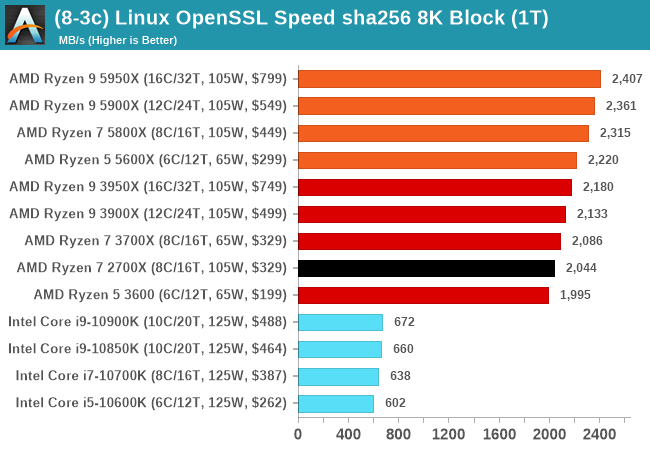
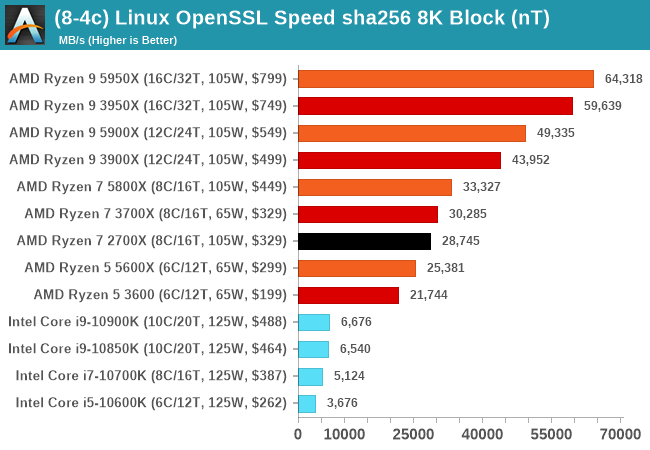
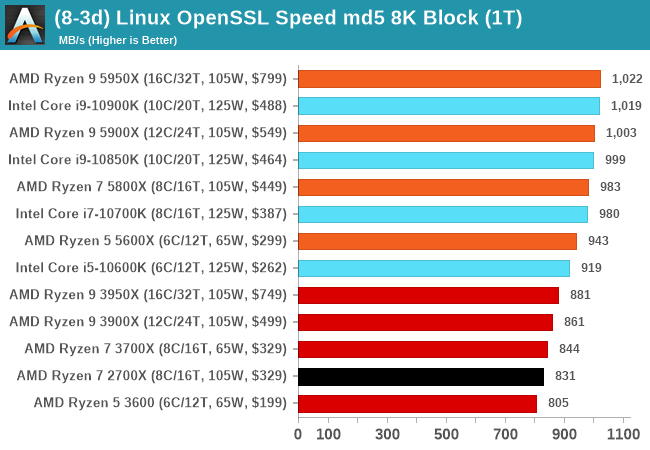
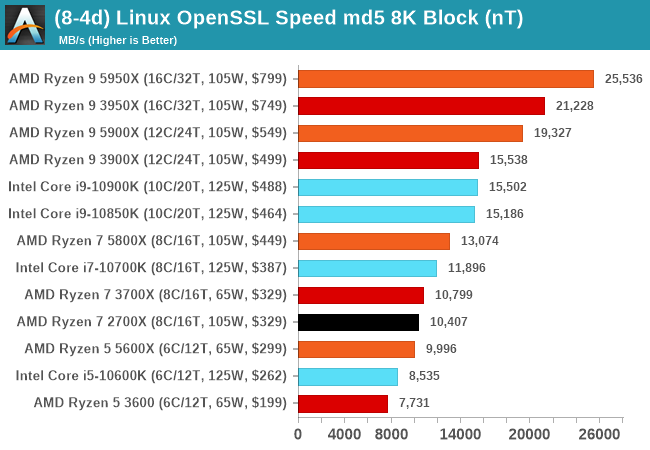
GeekBench 5: Link
As a common tool for cross-platform testing between mobile, PC, and Mac, GeekBench is an ultimate exercise in synthetic testing across a range of algorithms looking for peak throughput. Tests include encryption, compression, fast Fourier transform, memory operations, n-body physics, matrix operations, histogram manipulation, and HTML parsing.
I’m including this test due to popular demand, although the results do come across as overly synthetic, and a lot of users often put a lot of weight behind the test due to the fact that it is compiled across different platforms (although with different compilers).
We have both GB5 and GB4 results in our benchmark database. GB5 was introduced to our test suite after already having tested ~25 CPUs, and so the results are a little sporadic by comparison. These spots will be filled in when we retest any of the CPUs.
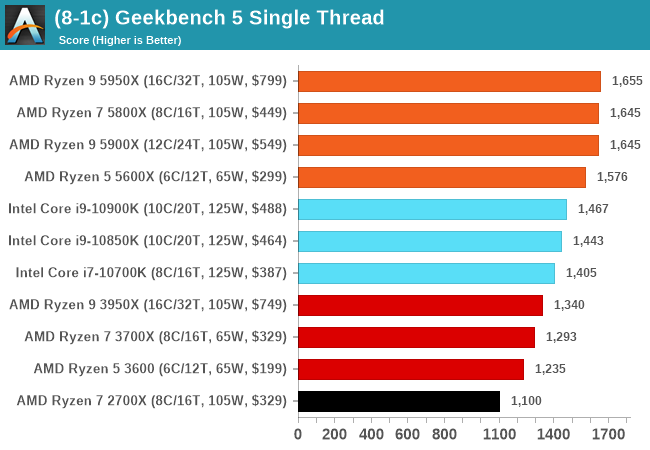
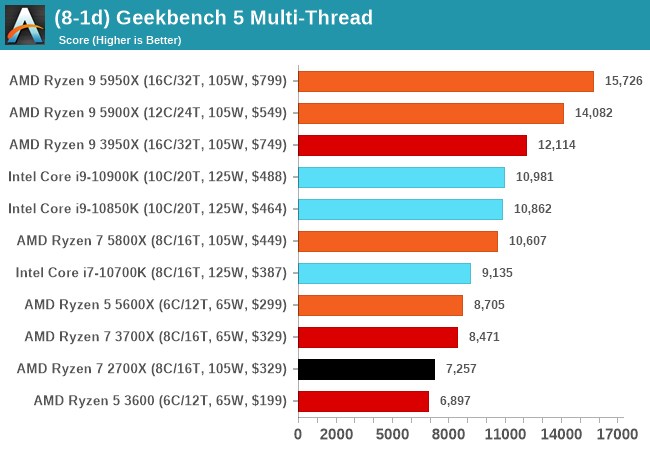










339 Comments
View All Comments
Luminar - Thursday, November 5, 2020 - link
Cache Rules Everything Around MeSIDtech - Thursday, November 5, 2020 - link
Hi Andrei,Excellent work. Do you know how this performance shapes up against the Cortex A77 ?
t.s - Friday, November 6, 2020 - link
Seconded. Want to know how the likes of ryzen 4 4350G or 5600 versus Cortex A77 or A78.Kangal - Saturday, November 7, 2020 - link
It's hard to say, because it really depends on the instruction/software as it is very situational. It also depends on the type of device it is powering, you can move up from Phones, to Thin Tablets, to Thick Laptops, to Large Desktops, and upto a Server. Each device offers different thermal constraints.The lower-thermal devices will favour the ARM chip, the mid-level will favour AMD, and the higher-thermal devices will favour Intel. That WAS the rule of thumb. In general, you could say Intel's SkyLake has the single-threaded performance crown, then AMD's Zen+ loses to it by a notable margin but beats it in multi-threaded tasks, and then going to an ARM Cortex A76 will have the lowest single-thread but the highest multi-threaded performance.
Now?
Well, there's the newly launched 2021 AMD Zen3 processor. And the upcoming 2021 ARM Cortex-X Overclocked Big-core using the new A78 microarchitecture. Lastly there's the 2022 Intel Rocket Lake yet to debut. So it's too early to tell, we can only make inferences.
Kangal - Saturday, November 7, 2020 - link
Here is my personal (yet amateur) take on the future 2020-2022 standpoints between the three racers. Firstly I'll explain what the different keywords and attributes mean(from most technical to most real-world implication)
Total efficiency: (think Full Server / Tractor) how much total calculations versus total power draw
Multi-threaded: (think Large Desktop / Truck) how much total calculations
Single-threaded: (think Thick Laptop / Car) how much priority calculations
IPC performance: (think Thin Tablet / Motorbike) how much priority calculations at desirable frequency/voltage/power-draw
*Emulating:
Having a "simple" ARM chip running "complex" x86 instructions. Such as running 32bit or 64bit OS X or Windows programs, via new techniques of emulation using a partial-hardware and hybrid-software solutions. I think the hit to efficiency will be around x3, instead of the expected x12 degradation.
So here are the lists (from most technical to most real-world implication)
Simple Code > Mixed code > Recommended Solution
Here's how they stack up when running identical new code (ie Modern Apps):
Total efficiency: ARM >>>> AMD >> Intel
Multi-threaded: ARM > AMD > Intel
Single-threaded: Intel = AMD > ARM
IPC performance: ARM >>> AMD > Intel
Now what about them running legacy code (ie x86 Program):
Efficiency + *emulating: AMD > Intel >> ARM
Multi + *emulating: AMD > Intel >> ARM
1n + *emulating: Intel = AMD >>> ARM
IPC + *emulating: AMD > Intel > ARM
My recommendation?
Full Server: 60% legacy 40% new code. This makes ARM the best option by a small margin.
Large Desktop: 80% legacy 20% new code. AMD is the best option with modest margin.
Thick Laptop: 70% legacy 30% new code. Intel is the best. AMD is very close (tied?) second.
Thin Tablet: 10% legacy 90% new code. ARM is the best option by huge margin.
Tomatotech - Monday, November 9, 2020 - link
Excellent post, but worth pointing out that *all* modern chips now emulate x86 and x64 code. They run a front end that takes x86 / x64 machine code then convert that into RISC code and that goes through various microcode and translation layers before being processed by the backend. That black box structure has allowed swapping out and optimising the back end for decades while maintaining code compatibility on the front end.So it’s not as simple to differentiate between the various chips as you make it out to be.
Gondalf - Sunday, November 8, 2020 - link
I don't know. Looking Spec results, we can say Anandtech is absolutely unable to set a Spec session correctly. From the review Zen 2 is slower per Ghz than old Skylake in integer, that is absolutely wrong in consumer cores (in server cores yes), even worse Ice Lake core is around fast as old Skylake per GHz.Basically this review is rushed and very likely they have set all AMD compiler flags on "fast" to do more contacts and a lot of hipe.
My God, for Anandtech Zen 3 is 35% faster in the global Spec values than Zen 2. Not even AMD worst marketing slide say this. We have Zen 4 here not Zen 3. Wait wait please.
A really crap review, the author need to go back to school about Spec.
Obviously the article do not say that 28W Tiger Lake is unable to run at 4.8Ghz for more than a couple of seconds, after this it throttes down, so the same Willow Cove core on a desktop Cpu could destroy Zen 3 without mercy on a CB session. Not to mention the far slower memory subsystem of a mobile cpu.
Basically looking at games results, Rocket Lake will eclipse this core forever. AMD have nothing of new in its hands, they need to wait Zen 4
Qasar - Sunday, November 8, 2020 - link
yea ok gondalf, trying to find ways that your beloved intel doesnt lose at everything now ??accept it, amd is faster then intel across the board.
Spunjji - Monday, November 9, 2020 - link
That's a strange claim about Tiger Lake performance, Gondalf, because I seem to recall Intel seeding all the reviewers with a laptop that could run TGL at 4.8Ghz boost 'til the cows come home - and that's what Anandtech used to get that number. It's literally the best they can do right now. You're right of course - in actual shipping ultrabooks, TGL is a hot PoS that cannot maintain its boost clocks. Maybe by 2022 they'll finally put Willow Cove into a shipping desktop CPU."Basically looking at games results, Rocket Lake will eclipse this core forever"
If by "eclipse" you mean gain a maximum 5% advantage at higher clock speeds and nearly double the power draw then sure, "eclipse", yeah. 🤭
I love your posts here. Please, never stop stepping on rakes like Sideshow Bob.
macroboy - Saturday, December 12, 2020 - link
LOL look at AMD's Efficiency and sustained core clocks, Intel runs too hot to stay at 5ghz for very long. meanwhile Zen3 plows along at 55C no problem, *you're the one who needs to check your facts.